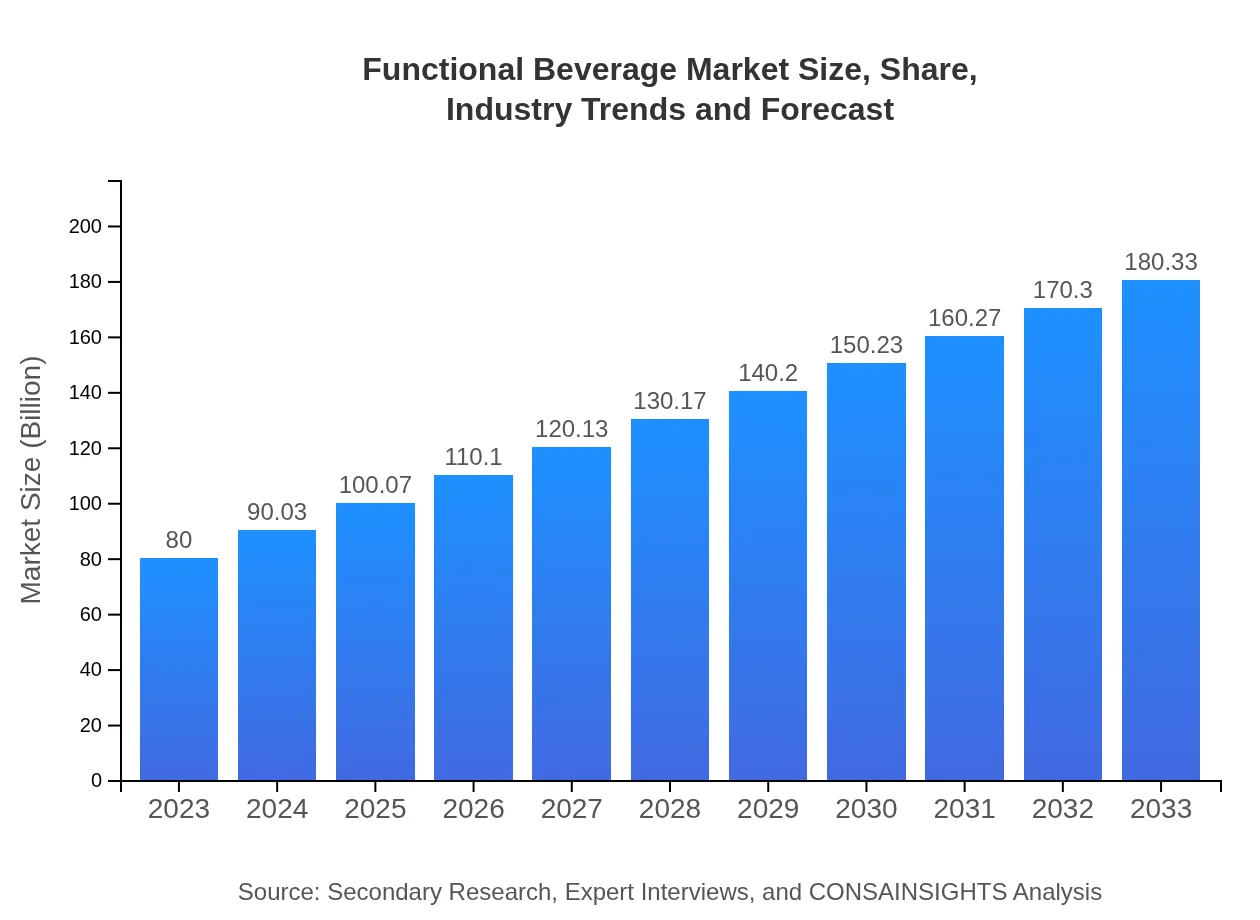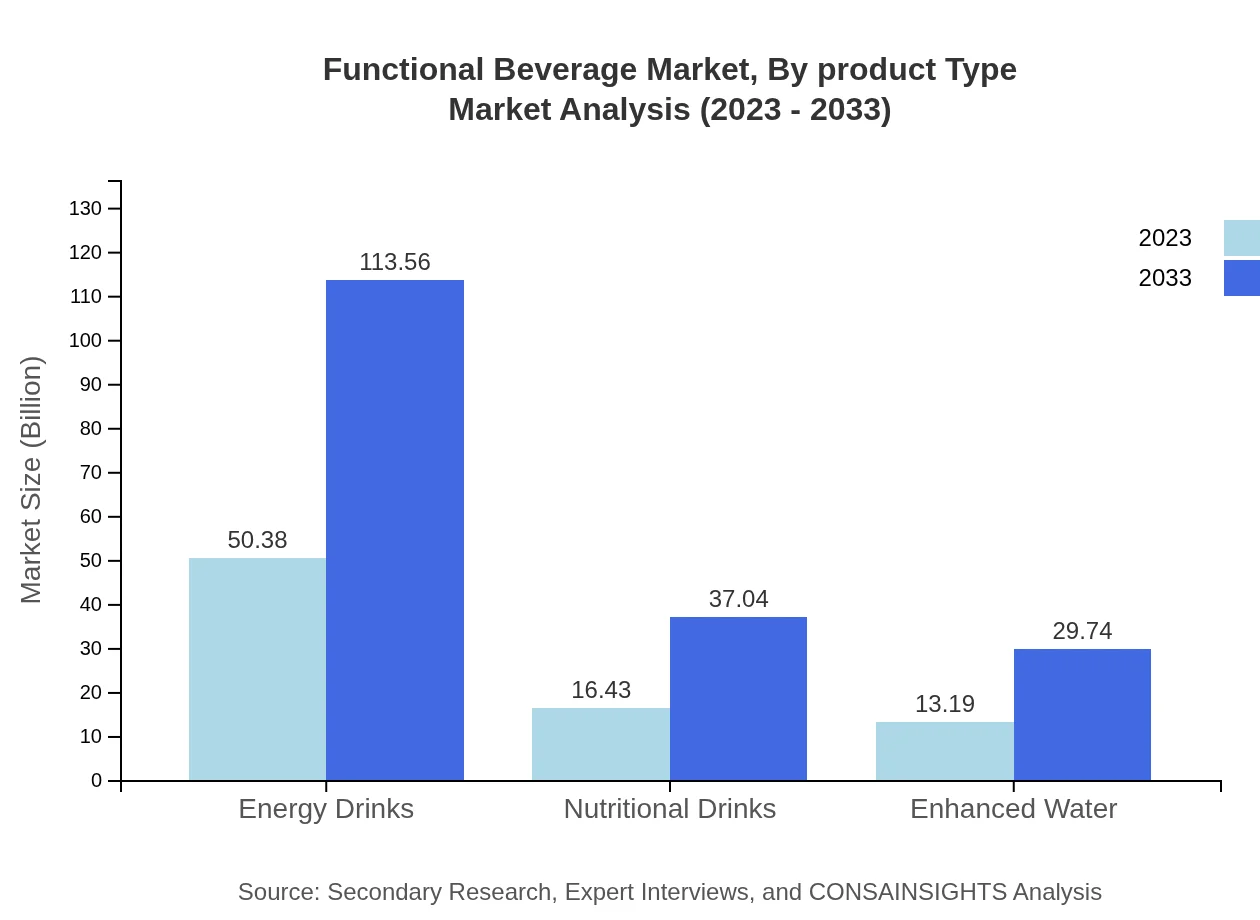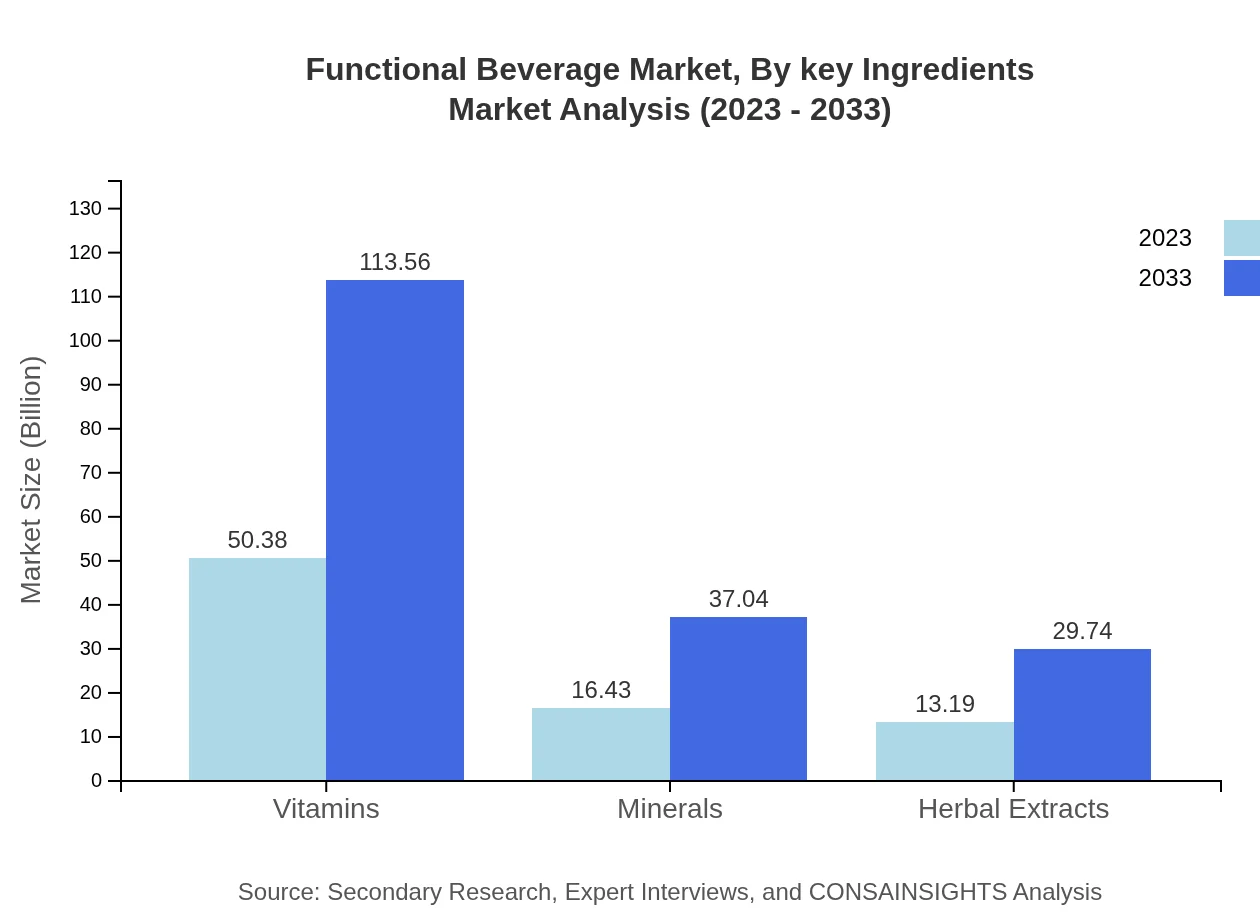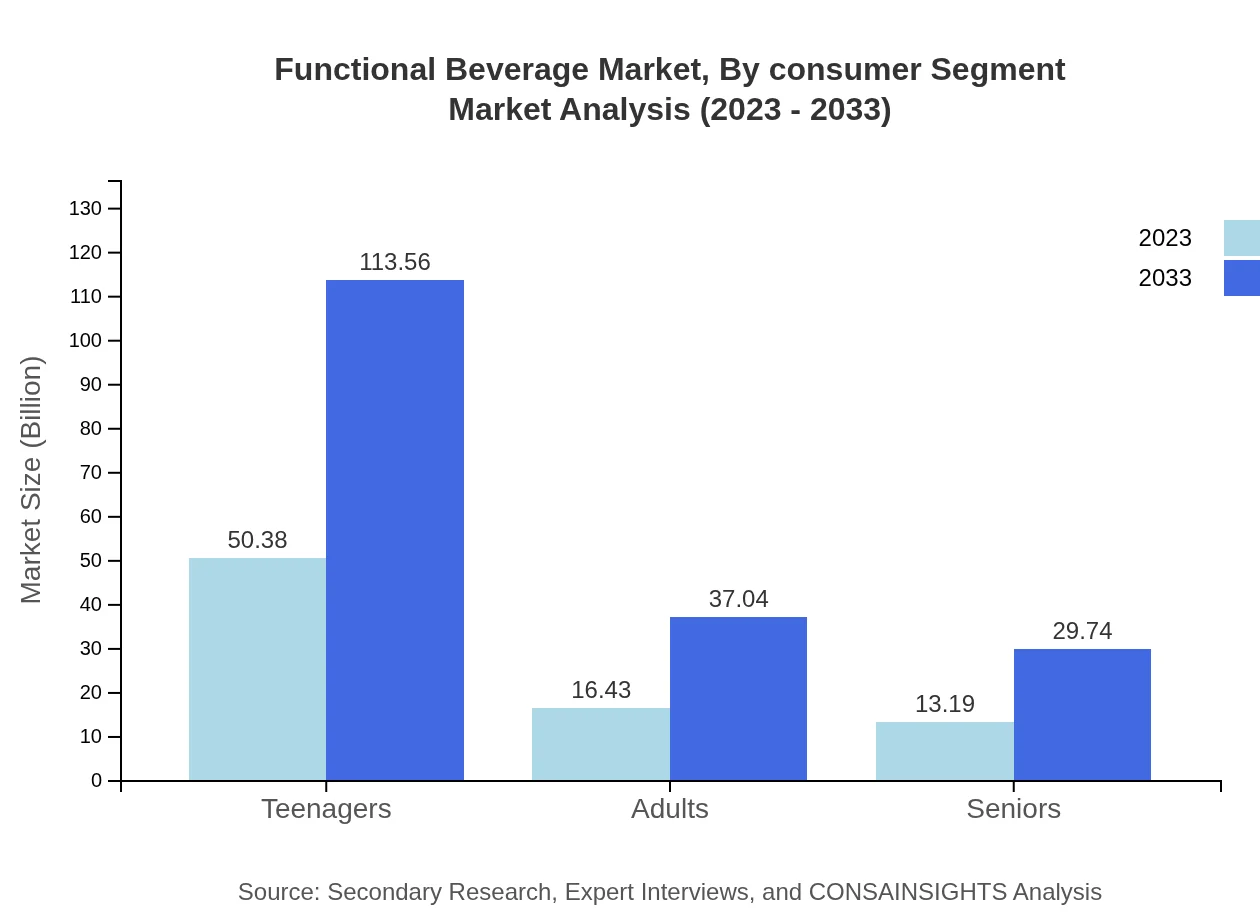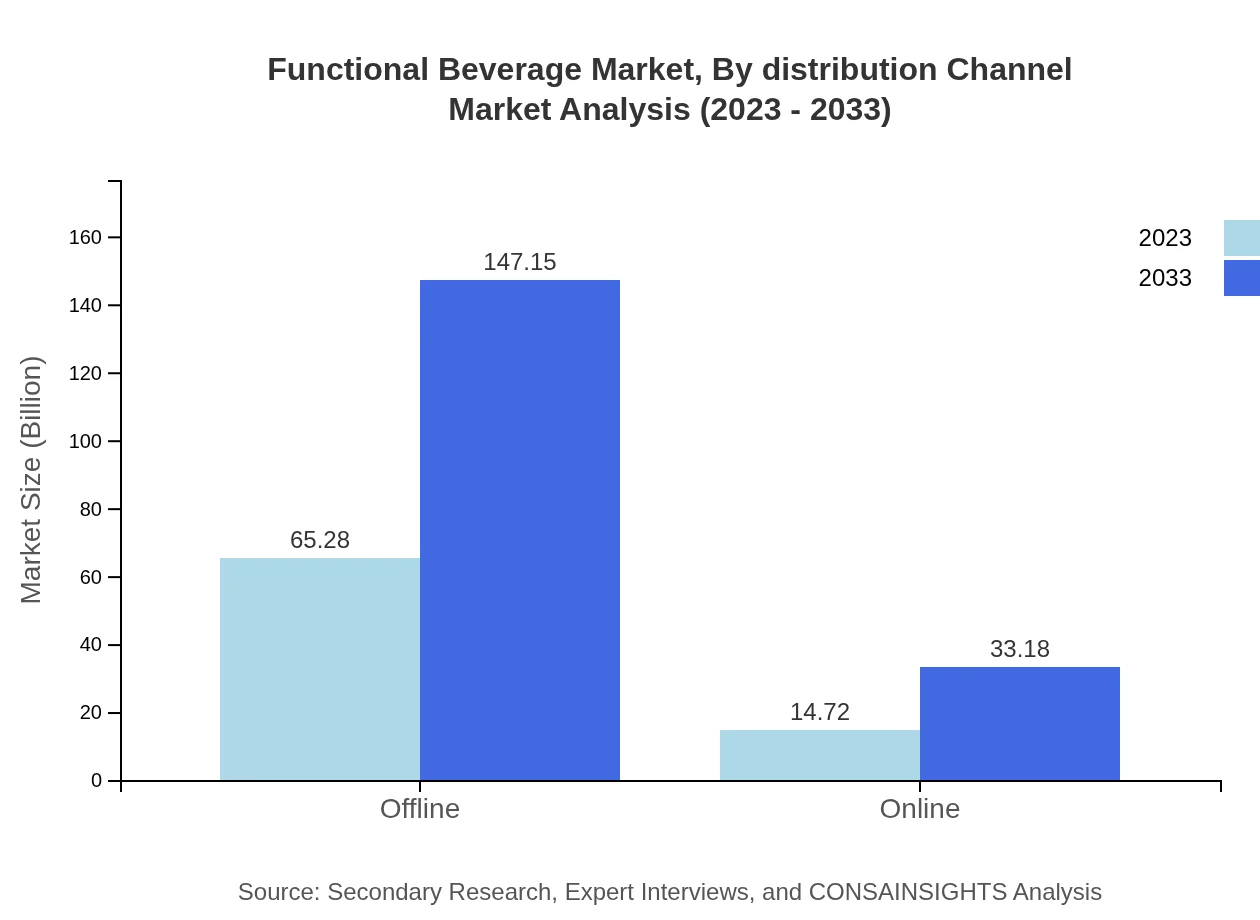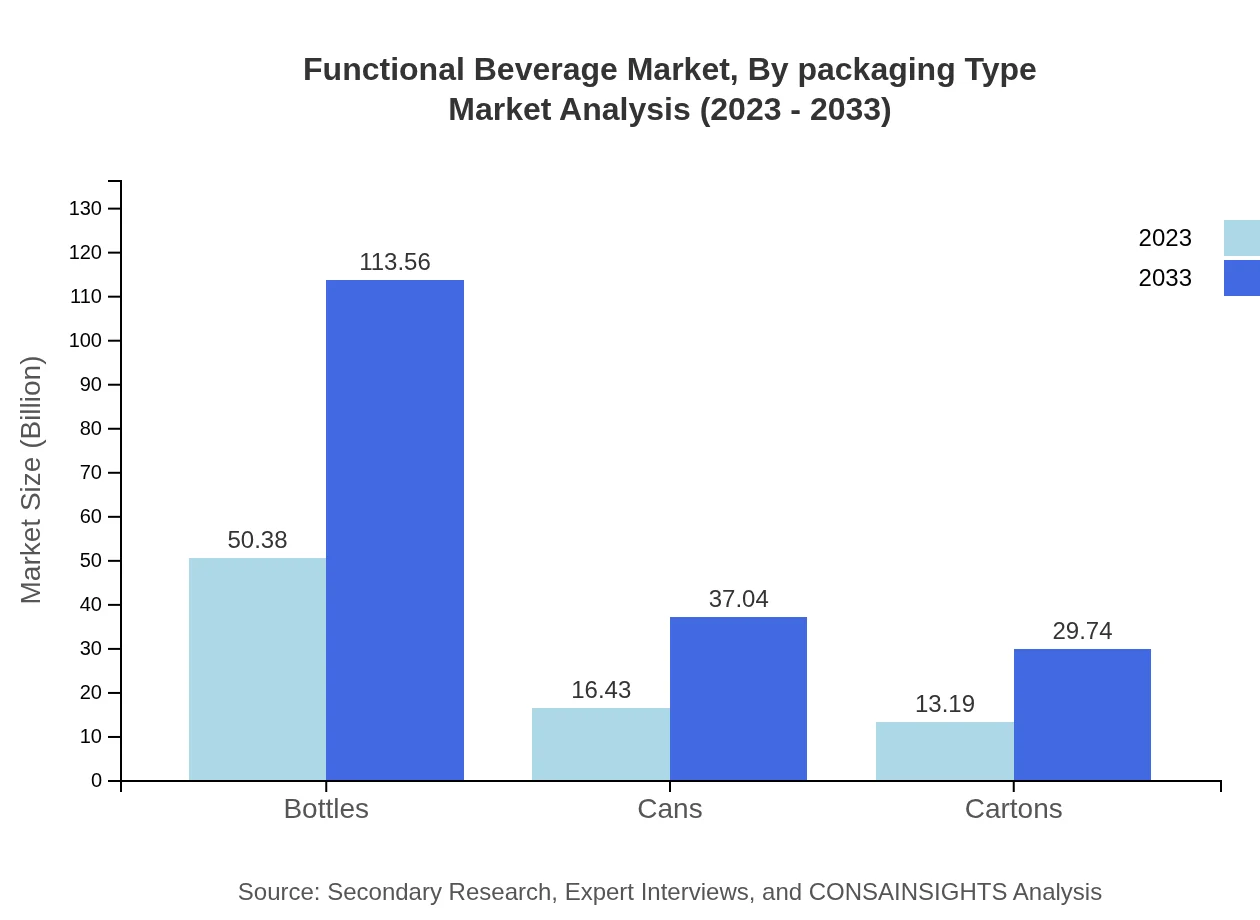Functional Beverage Market Report
Published Date: 31 January 2026 | Report Code: functional-beverage
Functional Beverage Market Size, Share, Industry Trends and Forecast to 2033
This report provides an in-depth analysis of the Functional Beverage market, covering market trends, size and growth forecasts from 2023 to 2033, industry analysis, and regional insights to offer a comprehensive view on future opportunities.
| Metric | Value |
|---|---|
| Study Period | 2023 - 2033 |
| 2023 Market Size | $80.00 Billion |
| CAGR (2023-2033) | 8.2% |
| 2033 Market Size | $180.33 Billion |
| Top Companies | Monster Beverage Corporation, Nestlé S.A., Coca-Cola Company, PepsiCo, Inc. |
| Last Modified Date | 31 January 2026 |
Functional Beverage Market Overview
Customize Functional Beverage Market Report market research report
- ✔ Get in-depth analysis of Functional Beverage market size, growth, and forecasts.
- ✔ Understand Functional Beverage's regional dynamics and industry-specific trends.
- ✔ Identify potential applications, end-user demand, and growth segments in Functional Beverage
What is the Market Size & CAGR of Functional Beverage market in 2023?
Functional Beverage Industry Analysis
Functional Beverage Market Segmentation and Scope
Tell us your focus area and get a customized research report.
Functional Beverage Market Analysis Report by Region
Europe Functional Beverage Market Report:
The European market is robust, having a size of $27.17 billion in 2023 and anticipated to grow to $61.24 billion by 2033. The demand is driven by increasing consumer awareness about health and well-being, complemented by a preference for premium and organic products.Asia Pacific Functional Beverage Market Report:
In the Asia Pacific region, the Functional Beverage market was valued at $14.95 billion in 2023 and is expected to reach $33.70 billion by 2033. Key drivers include urbanization, changing lifestyles, and increasing health awareness among consumers, particularly in countries like China and India.North America Functional Beverage Market Report:
North America leads the market, with a size of $27.56 billion in 2023, forecasting growth to $62.12 billion by 2033. The region is characterized by a high demand for functional beverages and innovative product launches driven by a health-conscious population.South America Functional Beverage Market Report:
The South American market, though smaller, is emerging with a current value of $0.73 billion projected to grow to $1.64 billion by 2033. Factors such as the rising popularity of wellness products and increasing disposable incomes are influencing this growth.Middle East & Africa Functional Beverage Market Report:
In the Middle East and Africa, the market size stands at $9.59 billion in 2023, expected to grow to $21.62 billion by 2033. Growth in this region is fueled by rising health concerns and the increasing trend of sports and fitness activities.Tell us your focus area and get a customized research report.
Functional Beverage Market Analysis By Product Type
The market encompasses various product types, including Energy Drinks, Nutritional Drinks, and Enhanced Water. Energy drinks dominate with a market size of $50.38 billion in 2023, expected to grow to $113.56 billion by 2033. Nutritional drinks account for $16.43 billion now, projected to increase to $37.04 billion by 2033, while enhanced water, starting at $13.19 billion, is estimated to reach $29.74 billion.
Functional Beverage Market Analysis By Key Ingredients
Key ingredients in Functional Beverages include Vitamins, Minerals, and Herbal Extracts. Vitamins lead the segment with a size of $50.38 billion in 2023, growing to $113.56 billion by 2033. Minerals also show strong growth, currently at $16.43 billion and expected to reach $37.04 billion, while Herbal Extracts are at $13.19 billion, projected to grow to $29.74 billion.
Functional Beverage Market Analysis By Consumer Segment
The consumer segment for Functional Beverages includes Teenagers, Adults, and Seniors. Teenagers represent the largest share at $50.38 billion currently, with projections of $113.56 billion by 2033. Adults account for $16.43 billion and are expected to grow to $37.04 billion, while Seniors show steady growth from $13.19 billion to $29.74 billion.
Functional Beverage Market Analysis By Distribution Channel
The distribution channels for Functional Beverages are categorized into Offline and Online. Offline sales dominate the market with $65.28 billion currently, expected to grow to $147.15 billion by 2033. Online sales, although smaller, are experiencing rapid growth, moving from $14.72 billion to $33.18 billion in the same period.
Functional Beverage Market Analysis By Packaging Type
Functional Beverages are packaged in Bottles, Cans, and Cartons. Bottles lead the packaging segment with current sales of $50.38 billion expected to rise to $113.56 billion. Cans follow with $16.43 billion, projecting to grow to $37.04 billion, and Cartons at $13.19 billion are expected to reach $29.74 billion.
Functional Beverage Market Trends and Future Forecast
Tell us your focus area and get a customized research report.
Global Market Leaders and Top Companies in Functional Beverage Industry
Monster Beverage Corporation:
A leading manufacturer of energy drinks known globally, Monster offers a diverse range of functional beverages targeting various consumer segments.Nestlé S.A.:
Nestlé leads the market with a vast portfolio of nutritional beverages, emphasizing health, wellness, and innovation.Coca-Cola Company:
Coca-Cola, recognized for its vast beverage offerings, has also made significant inroads into functional drinks, expanding its portfolio through strategic acquisitions.PepsiCo, Inc.:
PepsiCo offers a range of functional beverages, emphasizing energy drinks and healthy options, solidifying its position in this dynamic market.We're grateful to work with incredible clients.









FAQs
What is the market size of functional Beverage?
The global functional beverage market was valued at approximately $80 billion in 2023 and is projected to grow at a CAGR of 8.2% over the next decade. By 2033, the market is expected to see significant increases as health trends gain traction.
What are the key market players or companies in the functional Beverage industry?
Key players in the functional beverage industry include Coca-Cola, PepsiCo, Red Bull, Nestlé, and Monster Beverage. These companies dominate the market with a wide range of energy drinks, nutritional drinks, and enhanced waters that cater to various consumer needs.
What are the primary factors driving the growth in the functional beverage industry?
The growth in the functional beverage industry is driven by rising health consciousness, demand for convenient nutritional products, and innovation in product offerings. Additionally, consumer inclination towards natural ingredients and holistic wellness further fuels this market evolution.
Which region is the fastest Growing in the functional beverage market?
The functional beverage market is experiencing rapid growth in regions such as Europe and North America. By 2033, Europe's market is expected to reach $61.24 billion, while North America is projected at $62.12 billion, showcasing a robust demand.
Does ConsaInsights provide customized market report data for the functional Beverage industry?
Yes, ConsaInsights offers customized market report data tailored to client specifications in the functional beverage industry. Our personalized reports analyze specific regions, segments, and trends, enabling targeted strategies for businesses in this sector.
What deliverables can I expect from this functional Beverage market research project?
Clients can expect comprehensive deliverables including market analysis reports, competitor assessments, regional market breakdown, trend forecasts, and consumer behavior insights. These provide actionable intelligence to support strategic decision-making.
What are the market trends of functional Beverage?
Current trends in the functional beverage market include a shift towards plant-based ingredients, increased demand for low-sugar options, and a rise in on-the-go products. Consumers are increasingly favoring drinks that support hydration, energy, and immunity.

